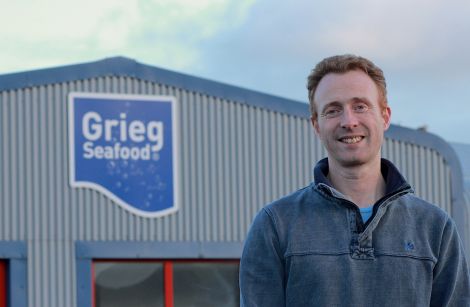News / Seafood firm reports big reduction in lice
SALMON farm company Grieg Seafood says the number of adult female sea lice affecting its fish in Shetland has fallen by nearly 90 per cent over the last year.
Grieg Seafood Shetland managing director Grant Cumming said a variety of factors, including new farming methods and colder sea temperatures, have helped to cut numbers of the naturally occurring parasite.
A report on the first quarter of 2018 states that Grieg harvested 1,201 tonnes during the period in its Shetland region, which includes the isles as well as Skye, compared to 1,293 tonnes companies to the previous year.
“We produced a loss for the first quarter which is disappointing, but we had a very low harvest volume, which is the main reason for showing a loss,” Cumming said.
But there was an 87 per cent reduction in adult female sea lice in Shetland when comparing the first quarter of 2018 to the same period last year.
It comes after data released in 2017 showed Grieg Seafood Shetland as being the worst performing company in Scotland when it came to sea lice.
When there are one or two lice they will graze on the salmon’s mucus, but the danger to animal welfare – if the lice are present in higher numbers – is that they graze through the mucus and start damaging the skin of the fish.
“We’re making a lot of changes to how we farm fish,” Cumming said.
“So there’s longer fallow periods, and farm management agreements with our neighbours that are more robust than they were in the past. But in addition to that, being able to treat our sea lice with fresh water has made a big difference to us too.”
He previously said that there is “no danger to human health from sea lice” and it was “very unlikely” that sea lice would make it into a packet of salmon sold in a supermarket.
Become a member of Shetland News
Cumming added that the sea in and around Shetland has been colder than the last four or five years – below seven degrees for the most of March – which has stunted the growth of lice.
“Other things that we’re doing is that we’re using a lot of cleaner fish to eat sea lice off our salmon, so going forward all our sites will be stocked with cleaner fish,” he said.
“And most of sites are being stocked as well with something called a sea lice skirt, which is a six metre deep tarpaulin which goes around the pen.”
Grieg’s accounts, meanwhile, were down by an extra £900,000 due to a feed barge sinking in Skye in November.
Cumming said it is unclear why the barge sunk and confirmed that it will be raised in the summer.
Become a member of Shetland News
Shetland News is asking its readers to consider paying for membership to get additional perks:
- Removal of third-party ads;
- Bookmark posts to read later;
- Exclusive curated weekly newsletter;
- Hide membership messages;
- Comments open for discussion.
If you appreciate what we do and feel strongly about impartial local journalism, then please become a member of Shetland News by either making a single payment, or setting up a monthly, quarterly or yearly subscription.









